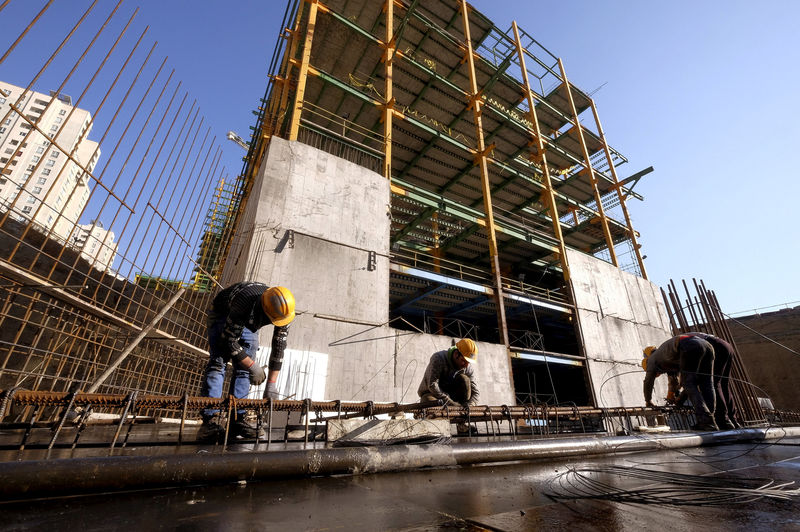By Bozorgmehr Sharafedin
DUBAI (Reuters) - Long used to lucrative state contracts, Iran's biggest construction company faces leaner times, as overseas firms better able to attract financing push for orders in an economy trying to open to the world after years of sanctions.
The misfortunes of Khatam al Anbia Construction Headquarters (KAA) are an unwelcome novelty for its powerful owners, the Revolutionary Guards, a military unit created by the Islamic Republic's founder Ayatollah Ruhollah Khomeini which also secured an economic foothold after the 1980s Iran-Iraq war.
The conglomerate came to dominate the building sector under the presidency of Mahmoud Ahmadinejad between 2005 and 2013, winning billions of dollars of state contracts for oil and gas facilities, roads and dams.
The Guards have not hesitated to make their displeasure public.
"The Islamic Revolutionary Guards Corps has huge potential in construction fields," Tasnim news agency quoted Guards chief Mohammad Ali Jafari as saying in March.
"Unfortunately, the government has not welcomed its (project) suggestions and activities."
KAA chief Ebadallah Abdollahi, who as a Guards commander often wears military uniform, said this month that one million people were working on the company's projects.
But KAA's dominance looks likely to fade as President Hassan Rouhani's administration draws up plans for huge infrastructure projects to jump-start the economy after international sanctions over Iran's nuclear program were removed in January, industry executives and analysts say.
Instead of enlisting KAA, the government is turning to foreign firms to discuss contracts for the projects partly because, with its budget strained by low oil prices and damage from the sanctions, it wants financial support from abroad.
"Iran is experiencing one of its worst financial times in history. The government has no money and KAA and other contractors have no financial resources," said Saeed Laylaz, a Tehran-based economist. "So the government's priority for construction projects is finding foreign sources of finance."
KAA did not respond to emails and phone calls seeking comment.
CONTRACTS
This month, South Korea's Daewoo Engineering & Construction Co reached a preliminary agreement with Iran to arrange $1.5 billion in financing for part of a highway connecting Tehran to the Caspian Sea, the company said.
KAA had expressed interest in the project but offered to provide only 40 percent of the required financing, reported the Tasnim news agency, which is close to the Guards.
China's National Transportation Equipment & Engineering Co is close to agreeing with Tehran on a $3 billion railway project to connect the capital with the northeastern holy city of Mashhad, a Chinese source familiar with the talks told Reuters. KAA had also expressed interest in that project.
Another Chinese group, Dalian Shipbuilding Industry Co, has been discussing a proposal to build container ships and oil tankers for Iran for up to $12 billion, sources said. If Dalian wins the contracts, it will squeeze out Iran Marine Industrial Co, majority-owned by KAA.
Since February, KAA has proposed participating in over 10 mega-projects but the government has not agreed in a single case, said a businessman who operates in the oil and gas sector and has direct contacts with senior Iranian officials.
Several factors appear to be behind the sidelining of KAA. One is that Chinese and Korean firms can count on financial support from their country's deep-pocketed export promotion institutions and banks.
Another is that while state-linked enterprises such as KAA prospered during the sanctions years, officials in Rouhani's administration have said they want to build a more efficient, dynamic economy in the post-sanctions era by increasing the role of market forces and the private sector.
"KAA has enormous engineering and technical power, but is not efficient," Laylaz said. "It will be downsized under the pressures of competition."
Politics may also be involved. The Guards are allied to conservative political interests who opposed the relatively liberal Rouhani's rise to power; his administration may now see little reason to support the Guards' commercial interests.
In any case, even after the removal of most sanctions against Iran, some penalties continue to overhang KAA because of its links to the Guards and their involvement in projects such as ballistic missile development.
KAA will remain on a European Union list of sanctioned entities for up to seven years, and on a U.S. sanctions list indefinitely. This will not block all foreign firms from doing business with KAA, but it will make them think carefully about the risks of dealing with an entity whose assets are frozen by the United States and the EU, sanctions experts said.
"Given the long reach of U.S. sanctions, there is a risk assessment that any prudent multinational company will need to undertake any time they do business with KAA and any of its subsidiaries," said Ramsey Jurdi, a Dubai-based sanctions lawyer with DLA Piper.
COMPLAINTS
In private discussions with government officials, KAA is protesting its exclusion from contracts, but it is unclear if the firm will have much success, construction industry sources said. The Guards and executives in the KAA group have also complained publicly about the company's plight.
KAA has said repeatedly it would have no problem working with foreign companies and that it has started talks on cooperation with some Asian and European firms.
A test of its prospects will come later this year, when the oil ministry is expected to release new contract terms for foreign investors in Iran's energy industry.
The ministry is expected to list some of KAA's affiliates as qualified potential partners for the foreign firms; the foreigners will have to decide if they want to stay away from the affiliates because of legal risk related to sanctions.
Reza Mostafavi Tabatabaei, a London-based oil analyst who has worked on projects in Iran, said it would be wrong for the Iranian government or foreign firms to count the company out.

"They should both accept KAA as a reality in Iran's economy. In the upstream oil sector there are not many companies that have KAA's technical and logistical power. Governments come and go, but KAA is here to stay."